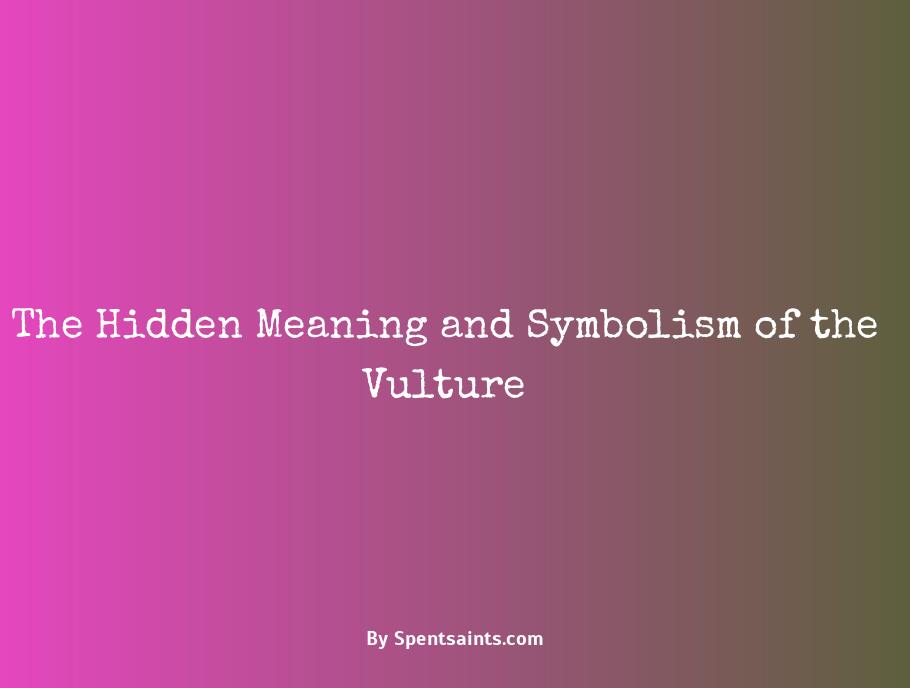Vultures have long captivated the human imagination with their large, soaring forms and attraction to the dead and dying. These unique birds have accumulated rich symbolic meaning across cultures and eras. By exploring vulture symbolism, we can uncover deeper lessons about life, death, and our spiritual journey.
Vultures play an important ecological role as nature’s clean-up crew, helping prevent the spread of disease by consuming carrion. However, their scavenging habits and ominous presence have shaped ambivalent cultural attitudes throughout history. Unpacking the layered symbolism of the vulture provides insight into both human psyche and spirit.
Spiritual Symbolism of the Vulture
Many ancient cultures and religions imbued the vulture with spiritual symbolism and meaning. In Egyptian mythology, vultures were associated with several important deities:
– Nekhbet, the vulture goddess, was patron of Upper Egypt and nurses and midwives. Vultures with outspread wings were seen as protective symbols.
– Mut, the mother goddess often depicted as a vulture, was linked to maternity and protection.
– The vulture goddess, Nekhbet, was thought to give protection. Her outstretched wings were depicted sheltering and guarding pharaohs.
In Hindu and Buddhist traditions, vultures represent purification and transcendence. The vulture, Jatayu, appears in the Hindu epic Ramayana as a loyal protector of Sita and embodiment of courage.
Negative Vulture Symbolism
While vultures have positive symbolic meaning in some cultural contexts, they more frequently represent negative attributes:
- Death and Decay – Vultures’ attraction to dead and rotting flesh has made them harbingers of death.
- Greed and Gluttony – Their ravenous scavenging evokes insatiable hunger and overindulgence.
- Impurity and Contamination – Eating decayed matter renders vultures unclean in Judeo-Christian and Islamic traditions.
- Omen – Seeing or dreaming of vultures is often believed to portend doom and disaster.
Positive Vulture Symbolism
Despite frequent negative associations, vultures can also represent positive symbolic meaning:
- Purification and Release – By consuming dead matter, vultures purge impurity and free the soul.
- Nobility – Their high-soaring flight is linked to ascension, grace, and nobility of spirit.
- Keen Sight – A vulture’s sharp vision symbolizes wisdom, clarity, and patience.
- Cunning – Their intelligence and opportunism signify guile and strategy.
Vulture Meanings in Ancient Cultures and Religions
Examining how vultures were viewed and used symbolically in various ancient cultures and religions provides deeper insight into their multi-layered meanings.
Ancient Egypt
Vultures had paradoxical symbolism in Ancient Egypt. They were revered as protective figures, but also feared as harbingers of evil:
- Goddess Nekhbet was shown as vulture, guardian and protector of pharaohs
- Vulture imagery signified maternity due to their devoted parenting
- Also seen as ominous bringers of illness, injury and death
Ancient Greece and Rome
The Greeks and Romans closely associated vultures with death and saw them as unlucky omens:
- Believed to embody evil spirits of the dead
- Spotting a vulture was an inauspicious sign foretelling doom
- Ancient Greeks saw the vulture as a solar symbol, linked to Apollo and sun gods
Mesoamerican Cultures
Vultures carried symbolic meaning related to death and the underworld in Mesoamerican cultures like the Aztec and Maya:
- The Aztec god of death, Mictlantecuhtli, was closely associated with vultures and owls
- Maya death god Hunhau was often depicted with vultures wings and features
- Vultures linked to funerary rituals and guided souls to the afterlife
Negative Vulture Symbolism and Representations
The vulture’s grim feeding habits and menacing presence have spawned many negative symbolic associations throughout history and across cultures:
Death and Decay
Circling high above scenes of death, vultures are commonly viewed as harbingers and reminders of mortality. Their carrion diet connects them to rot and decay in many mythological and literary works.
Greed and Rapaciousness
Vultures’ tendency to voraciously consume carrion evokes greedy gluttony. Literary depictions often highlight their ravenous and rapacious nature.
Impurity and Contamination
Feeding on corpses and excrement renders vultures taboo animals in many cultures. Judeo-Christian tradition declared them unclean. In Islam, contact with vultures necessitates ritual purification.
Omen and Ill Fortune
Spotting a vulture overhead or in a dream is widely considered a bad omen portending catastrophe, misfortune and death across many cultures.
Positive Attributes of Vulture Symbolism
While overwhelmingly negative, vultures have some positive symbolic connotations in certain cultural and literary contexts:
Purification and Release
By rapidly consuming dead remains, vultures represent purification and freeing the deceased’s spirit. This links to reincarnation in Hindu/Buddhist traditions.
Nobility and Ascension
The vulture’s powerful and graceful flight can symbolize transcendence, nobility, and proximity to the divine in some depictions.
Wisdom and Patience
A vulture’s keen eyesight and patience in awaiting prey are associated with wisdom, clairvoyance and focus on Buddhist/Hindu symbolism.
Cunning and Strategy
Vultures opportunistically exploit death for sustenance, connoting intelligence, guile and survival instincts in some cultural interpretations.
Ultimately, vultures occupy an intriguing middle ground between life and death in the human psyche. Their ominous presence reminds us of mortality’s inevitability. Yet by picking flesh clean, they facilitate rebirth and renewal. Vultures transmute death into new life – a powerful symbolic message of hope.
Negative symbols like greed and impurity convey moral lessons. And vultures’ intelligence and adaptability offer inspiring models for combining pragmatism and vision. Their elevated flight towards the heavens provides an uplifting call to rise above earthly woes.
By patiently observing and gleaning sustenance from adversity, vultures shed light on how we can likewise learn and grow spiritually from difficulty and grief. Their shadowy wisdom carries uplifting truths: mortality makes living precious, death enables rebirth, and ascending above suffering brings enlightenment.

Dreams, spirit, growth – I explore them all. Laugh, learn, grow with me. Unlock your inner guru.
